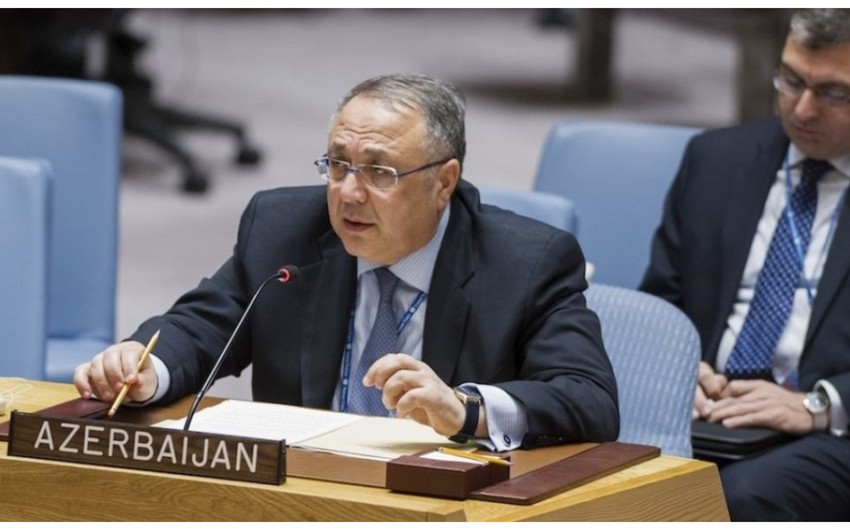The United Nations Security Council has held a debate on mine clearance.
Azerbaijan's Permanent Representative to the UN, Yashar Aliyev, made a report on Azerbaijan's situation in virtual open debates, Report informs.
The diplomat said that landmines and improvised explosive devices (IEDs) continue to affect the daily lives of many countries in conflict and post-conflict situations, posing a deadly threat to civilians, the military, peacekeepers, and humanitarian personnel. "We appreciate the support of the United Nations in strengthening the capacity of mine action in Azerbaijan. The Azerbaijan National Agency for Mine Action (ANAMA), established in 1999, has helped neutralize more than 800,000 mines and other explosive ordnance in Azerbaijan over the past 20 years the United Nations Development Program, ensuring the safe return of more than 160,500 IDPs to their homes. However, Azerbaijan is on the list of post-conflict countries that still suffer from landmines and war's explosive effects."
The head of the Permanent Mission of Azerbaijan to the UN noted that Armenia launched a full-scale war against Azerbaijan in late 1991 - early 1992. As a result, a large part of Azerbaijani territory was occupied by Armenia. The war claimed tens of thousands of lives, destroyed cities, settlements, and villages, and forced more than 700,000 Azerbaijanis to flee the occupied territories.
He said that in response to another act of aggression by Armenia on September 27, 2020, the Azerbaijani Armed Forces liberated about 10,000 square meters of the territory of 300 cities, settlements, and villages of Azerbaijan as a result of the successful counter-attack operation.
The Declaration signed by the President of the Republic of Azerbaijan, the President of the Russian Federation, and the Prime Minister of the Republic of Armenia on November 10, 2020, put an end to nearly 30 years of armed conflict between Armenia and Azerbaijan and set agreed parameters for reaffirming lasting peace in the region. On January 11, 2021, the leaders of the three countries signed another joint statement. The statement is aimed at implementing practical steps to remove barriers to economic and transport links in the region.
However, since the signing of the Declaration on November 10 of last year, 20 Azerbaijani citizens, including 14 civilians, have been killed, and 87 civilians, including 16 civilians, have been seriously injured by landmines in the liberated areas. During the conflict, most of the occupied territories of Azerbaijan, including cemeteries, historical sites, and other civilian objects, were consistently and sporadically mined by Armenia.
The statement said that Armenia refused to provide information on the mined areas in the liberated territories. In doing so, it is deliberately risking people's lives and trying to prevent post-conflict restoration, reconstruction, and humanitarian efforts in the liberated territories, as well as the safe return of IDPs to their homes.
Aliyev stressed that Armenia's actions are a clear violation of international law, demonstrating its unwillingness to fulfill its international obligations and abandon the policy of confrontation.
The diplomat said: "In his report on a comprehensive approach to mine action, the Secretary-General stressed that mine action is a significant practical contribution to building trust between the parties as a herald of peace and sustainable development (S / 2018/623). The conceptual note prepared for today's meeting similarly states that mine action, in particular, is crucial for sustainable development and makes a positive contribution to maintaining stability and peace (S / 2021/284). These words are highly relevant today. Since the new situation opens up opportunities for hundreds of thousands of IDPs to exercise their right to return safely to their place of birth. Despite the devastating consequences of the war, it offers unique opportunities and real prospects for peace, stability, the restoration of peaceful coexistence, the advancement of the peace issue on the agenda, and investment in economic development and cooperation. Therefore, the international community's immediate response is of great importance to ensure justice, responsibility, protection of the lives and rights of those threatened by landmines, and the explosive consequences of war."


 https://static.report.az/photo/846566cf-b979-33bf-9025-58631b3bac63.jpg
https://static.report.az/photo/846566cf-b979-33bf-9025-58631b3bac63.jpg

